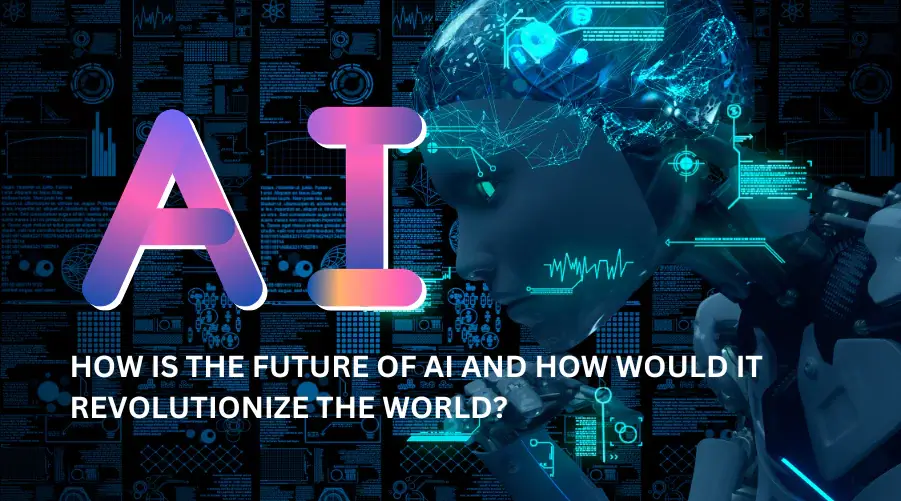Artificial Intelligence (AI) is no longer just a concept in science fiction; it’s a reality that’s transforming our world at an incredible pace. From virtual assistants like Siri and Alexa to advanced systems that predict diseases and drive cars, AI is revolutionizing how we live and work. But what does the future hold for this powerful technology? How will AI continue to evolve, and what impact will it have on our daily lives, jobs and society as a whole? In this blog, we’ll explore the exciting possibilities and potential challenges that lie ahead. Join us as we delve into the future of AI and discover how it will shape our world in ways we can only begin to imagine.
The Advancement of AI
Artificial Intelligence (AI) has come a long way! In the 1950s, AI started with basic tasks, like solving math problems. By the 1990s, it got smarter and could even beat humans at chess. Fast forward to today, AI is everywhere. It helps us find information on Google, recommends movies on Netflix, and even drives some of our cars!
AI learns from data, much like how we learn from experience. The more data it gets, the better it becomes. This process, called machine learning, allows AI to recognize patterns and make decisions.
The future of AI looks bright and exciting. We might see AI doctors, AI teachers, and even more advanced robots. While it’s important to use AI responsibly, there’s no denying its potential to make our lives easier and more efficient. The journey of AI is a fascinating story of constant growth and innovation!
Understanding the Current Landscape of Artificial Intelligence
Artificial Intelligence (AI) is transforming our world in remarkable ways. Today, AI is everywhere, from the voice assistants on our phones to the algorithms recommending our next favorite movie. But what exactly is AI?
AI refers to machines designed to mimic human intelligence. These systems can learn, reason, and solve problems. Recent advancements have made AI more powerful and accessible. For example, AI can now analyze vast amounts of data quickly, helping doctors diagnose diseases or enabling cars to drive themselves.
AI’s impact is vast and growing. In business, it’s improving efficiency by automating routine tasks. In healthcare, it’s advancing personalized medicine. Despite its benefits, AI also raises important ethical questions, such as ensuring privacy and avoiding bias in decision-making.
Understanding AI is crucial as it continues to shape our future. Staying informed and engaged with AI developments will help us harness its potential responsibly and ethically.
How AI Will Change the Future
Artificial Intelligence (AI) is revolutionizing our world so as our dependence on AI technology and AI Use in daily life very soon in coming days AI Driven Mobile phones are about to come which can help you in a lot more things but will they help you in actual or not is a question which no one can answer right now as AI reads past data and understand things to get the result. Here’s how it will shape our future & the future of ai:
Healthcare:
Artificial Intelligence (AI) is set to revolutionize healthcare, offering improvements in diagnostics, disease prediction, and personalized treatments. AI algorithms can analyze medical data with incredible accuracy, identifying patterns that may be missed by human doctors. This leads to earlier and more precise diagnoses, which are crucial for successful treatment outcomes. By predicting diseases before symptoms appear, AI can prompt preventive measures, reducing the severity or even preventing the onset of illnesses.
Additionally, AI can tailor treatments to individual patients by analyzing their unique genetic makeup, lifestyle, and medical history. This personalized approach ensures that each patient receives the most effective treatment for their specific condition, enhancing recovery rates and reducing adverse effects. The integration of AI into healthcare not only promises to improve patient outcomes but also to streamline healthcare processes, making them more efficient and accessible. With AI, the future of healthcare looks brighter, offering hope for better health and well-being for everyone.
Education:
As we look to the future, advancements in technology, particularly Artificial Intelligence (AI), promise to revolutionize how we learn. AI can personalize education, adapting to the unique pace and style of each student. It offers virtual tutors that provide instant feedback and tailored lessons, making learning more effective and engaging. Moreover, AI-powered platforms can analyze vast amounts of data to identify student strengths and weaknesses, allowing educators to customize teaching strategies accordingly. This not only improves academic performance but also fosters a deeper understanding of subjects.
Furthermore, AI expands access to education globally, breaking down barriers of location and resources. It facilitates lifelong learning through online courses and interactive tools. While AI complements human teachers, it also challenges traditional methods, encouraging innovation in curriculum design and teaching practices. Ultimately, AI in education promises a future where learning is personalized, inclusive, and empowering for all.
Transportation:
Imagine a world where cars drive themselves, navigating streets with precision and safety. Self-driving vehicles promise to reduce accidents caused by human error, making roads safer for everyone. Commutes will become more efficient as AI optimizes traffic flow and reduces congestion.
Furthermore, AI-powered drones could revolutionize delivery services, swiftly transporting goods to our doorsteps. These drones can navigate complex routes and deliver packages faster than traditional methods. Moreover, public transportation will become more accessible and reliable with AI monitoring systems that predict and prevent delays.
As AI continues to advance, the transportation landscape will evolve, offering smarter, greener, and more convenient options for commuters and businesses alike. The future of transportation is not just about getting from point A to point B, but about doing so in a way that enhances efficiency, safety, and sustainability.
Jobs:
Artificial Intelligence (AI) is reshaping industries by automating tasks and processes, leading to concerns about job displacement. However, this shift also creates new opportunities. Jobs in AI development, data science, and cybersecurity are in high demand, requiring specialized skills that can adapt to technological advancements.
Moreover, AI complements human capabilities by handling repetitive tasks, allowing workers to focus on more creative and strategic endeavors. Industries like healthcare, finance, and logistics are integrating AI to enhance efficiency and innovation. While some traditional roles may decline, new professions are emerging, emphasizing the need for continuous learning and upskilling.
In essence, while AI may alter job landscapes, it also presents avenues for growth and specialization. Adapting to these changes will be crucial for individuals and industries to thrive in the AI-driven future.
Customer Services:
It’s more than just resolving issues—it’s about creating positive experiences. With advancements in technology, AI-powered chatbots are becoming increasingly common. These bots provide instant responses to customer queries, ensuring round-the-clock availability and quick solutions.
AI analyzes customer data to personalize interactions, anticipating needs before they arise. This level of customization enhances satisfaction and builds loyalty. However, human touch remains vital. Skilled representatives handle complex problems and offer empathetic support that AI can’t replicate.
Customer service is evolving beyond traditional phone calls and emails. Social media platforms serve as new avenues for feedback and support. Companies use these channels to engage directly with customers, turning complaints into opportunities for improvement.
Effective customer service is about balancing technology with human connection. It’s about making each interaction meaningful, leaving customers satisfied and loyal to the brand.
The Impact of AI on the Environment:
By analyzing vast amounts of data, AI helps scientists monitor climate change patterns, predict natural disasters, and manage ecosystems more effectively. AI-powered sensors track air and water quality in real-time, alerting authorities to pollution hotspots. This technology also aids in wildlife conservation by tracking animal populations and detecting illegal poaching activities.
AI optimizes energy consumption through smart grids and predictive maintenance of renewable energy sources like wind and solar. This reduces carbon footprints and enhances sustainability efforts globally. In agriculture, AI-driven precision farming techniques minimize pesticide use and maximize crop yields, promoting eco-friendly practices.
As AI continues to evolve, its potential to address environmental challenges grows. By leveraging its analytical power and predictive capabilities, AI offers promising solutions to ensure a cleaner, healthier planet for future generations.
Improve Business Automation:
Around 55% of organizations now use AI to some extent, indicating more automation ahead for businesses. Chatbots and digital assistants are becoming common, helping companies manage customer interactions and answer employee questions effortlessly.
AI’s strength lies in processing large data sets quickly and presenting insights visually, speeding up decision-making. Leaders no longer need to sift through data manually; they can rely on AI to provide instant, actionable insights for informed decision-making.
What are the Challenges in AI Research?
Here are the challenges in AI research summarized in points:
Data Quality and Quantity:
Data quality refers to how accurate, reliable, and relevant the information is for AI systems to learn from. Poor quality data can lead to biased or inaccurate outcomes, affecting everything from healthcare diagnoses to financial predictions.
Moreover, the sheer quantity of data available can overwhelm AI systems, making it challenging to sift through and find meaningful patterns. Balancing data quality with quantity is crucial: too little data limits AI’s capabilities, while too much can slow down processing and increase costs.
Ensuring data is clean, diverse, and representative of the population it serves is essential for building fair and effective AI systems. As technology evolves, improving data collection methods and ethical considerations around data usage will continue to be pivotal in shaping AI’s impact on society.
Bias and Fairness:
AI systems, like people, can inadvertently reflect biases present in the data they are trained on. This can lead to unfair outcomes, especially in critical areas like lending, hiring, and law enforcement.
To address this, researchers are developing methods to detect and mitigate bias in AI algorithms. They aim to create more diverse and representative datasets and incorporate fairness metrics into AI models. Transparency is crucial—understanding how decisions are made helps ensure fairness.
Ethical considerations are paramount. Striking a balance between innovation and responsibility is key. By promoting diversity in AI development teams and engaging with communities affected by AI technologies, we can strive for more equitable solutions.
Ultimately, tackling bias and promoting fairness in AI is not just a technical challenge but a moral imperative, shaping a future where technology benefits everyone fairly.
Interpretability:
interpretability refers to understanding how AI systems make decisions. It’s like peeking into the mind of a machine. Why does it matter? Well, imagine trusting a decision without knowing why it was made—it’s like driving blindfolded!
Interpretability ensures transparency and accountability. It helps us trust AI’s recommendations in healthcare, finance, and more. For example, in medicine, knowing why AI suggests a diagnosis allows doctors to make informed decisions.
But achieving interpretability isn’t easy. AI models can be complex, like puzzles with many pieces. Researchers are developing methods to make AI more transparent—like showing which data influenced a decision.
In a world where AI is becoming part of daily life, interpretability isn’t just about understanding machines—it’s about making AI work better for us, ensuring it’s fair, safe, and reliable.
Computational Resources:
AI models require vast amounts of computing power to process complex algorithms efficiently. This demand strains hardware capabilities, causing issues like slow processing speeds and high energy consumption. Access to such resources can be limited due to cost and availability, hindering widespread AI adoption. Additionally, training AI models often requires specialized hardware like GPUs and TPUs, which adds to the expense and complexity.
Furthermore, as AI tasks grow in complexity (such as natural language processing or image recognition), so does the need for more powerful computational resources. This perpetual demand for better hardware challenges researchers and companies to innovate in both hardware and software to optimize efficiency and reduce costs. Addressing these challenges is crucial for advancing AI technology and making it more accessible for various applications, from healthcare to finance and beyond.
Ethical Concerns:
Ethical concerns in artificial intelligence (AI) are crucial as this technology becomes more integrated into our lives. One major issue is bias, where AI systems can unintentionally learn and replicate prejudices present in the data they are trained on. This can lead to unfair outcomes, such as biased hiring practices or discriminatory loan approvals.
Another concern is transparency. Many AI systems function as “black boxes,” meaning their decision-making processes are not easily understood. This lack of transparency can make it difficult to trust AI decisions, especially in critical areas like healthcare and criminal justice. Privacy is also a significant issue. AI systems often rely on vast amounts of personal data, raising concerns about how this information is collected, stored, and used. Ensuring that AI respects user privacy and operates securely is essential. Addressing these ethical concerns requires developing clear guidelines and regulations to ensure AI is used responsibly and benefits everyone.
Security:
As AI systems become more integrated into various aspects of our lives, from personal assistants to autonomous vehicles, ensuring their security is paramount. One major issue is the vulnerability of AI systems to cyber-attacks. Hackers can manipulate AI algorithms, leading to harmful outcomes, such as misclassification in facial recognition systems or erroneous decisions in autonomous driving. Additionally, securing the vast amounts of data that AI systems rely on is crucial. If data is compromised, it can not only skew AI results but also lead to significant privacy breaches. Ensuring robust security measures involves continuous monitoring, regular updates, and the development of more resilient AI models. Moreover, educating developers and users about potential security risks and best practices is essential in building a safer technological environment. Addressing these security challenges is key to maintaining trust and reliability in AI systems.
Interdisciplinary Collaboration:
Interdisciplinary collaboration involves experts from different fields working together to solve complex problems. This approach is essential in today’s world because many challenges, like climate change, public health, and artificial intelligence, are too complex for any single discipline to tackle alone.
In interdisciplinary collaboration, scientists, engineers, social scientists, and other experts combine their knowledge and perspectives. This mix of skills and insights leads to more innovative solutions than if each field worked in isolation. For example, in AI research, computer scientists, ethicists, and sociologists must collaborate to ensure that new technologies are not only technically sound but also ethically and socially responsible.
Effective interdisciplinary collaboration requires open communication, mutual respect, and a willingness to learn from each other. It can be challenging due to differences in terminology, methods, and priorities across fields, but the benefits far outweigh the difficulties. By working together, diverse teams can create more comprehensive and effective solutions to the world’s most pressing issues.
Ethical Considerations in AI Development
Ethical considerations in AI development are crucial for ensuring that this powerful technology benefits society while minimizing harm. As AI systems become more integrated into everyday life, addressing issues such as bias, transparency, and accountability is essential. Bias in AI can arise from training data that reflect existing societal prejudices, leading to unfair outcomes in applications like hiring or law enforcement. Ensuring transparency involves making AI decision-making processes understandable and accessible, helping build trust and allowing users to challenge or understand AI-driven conclusions.
Accountability is another key aspect, as it is often unclear who is responsible when an AI system causes harm. Developers, companies, and regulators must work together to establish clear guidelines and standards. Additionally, the ethical use of AI involves considering privacy concerns, as AI systems often require large amounts of personal data. Protecting this data and using it responsibly is critical to maintaining public trust and ensuring the positive impact of AI technology.
For more such Tech News Visit us more and more.


